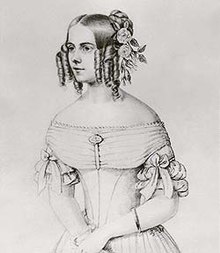Rosalie von Rauch
Rosalie Wilhelmine Johanna von Rauch (born August 29, 1820 in Berlin ; † March 5, 1879 in Albrechtsberg Castle near Dresden ) was Countess von Hohenau, the second, morganatic wife of Prince Albrecht of Prussia ( 1809–1872), the youngest , since 1853 Brother of King Friedrich Wilhelm IV of Prussia, Kaiser Wilhelm I and Tsarina Alexandra Feodorovna . She was previously the maid of honor of Prince Albrecht's first wife Marianne Princess of Prussia .
Life
Rosalie was a daughter of the Prussian Minister of War and General of the Infantry Gustav von Rauch (1774-1841) from his second marriage to Rosalie von Holtzendorff . Her brothers were the court marshal Adolf von Rauch (1805–1877), the general of the cavalry Gustav Waldemar von Rauch (1819–1890), the chief equerry of the German emperors and Prussian kings Fedor von Rauch and the general of the infantry Albert von Rauch (1829– 1901).
She became court lady of Marianne Princess of Prussia (1810-1883), a born princess of Orange-Nassau , who was married to Prince Albrecht of Prussia (1809-1872) since 1830.
In 1845 Albrecht von Prussia and Rosalie von Rauch began an extra-marital love affair, which resulted in the separation of Marianne and Albrecht. When Marianne entered into a love affair with Johannes van Rossum in 1848 and had a son by him in 1849, the Prussian and Dutch courts finally agreed to the divorce that Marianne and Albrecht had longed for.
On June 13, 1853, Rosalie became the second and morganatic wife of Prince Albrecht of Prussia (1809–1872) in Meiningen . On May 28, 1853, Rosalie had been raised to Countess of Hohenau by Duke Georg II of Saxony-Meiningen (1826-1914), the husband of Albrecht's eldest daughter Charlotte (1831-1855) . Your new family name seemed like an allusion to the name Hohenzollern.
Because of the connection, which the Prussian king vehemently rejected, she was denied access to Prussian-ruled countries. Albrecht had already come into conflict with his eldest brother Friedrich Wilhelm IV because of his divorce from Princess Marianne . Therefore Albrecht founded his new household in Saxony and was near Dresden - in today's district Loschwitz - the albrechtsberg palace building. The wedding with Rosalie had to take place outside of Prussia, in the Duchy of Saxony-Meiningen, with her daughter and son-in-law, in the village church of Schweina . The Prussian ambassador in Dresden , Heinrich Alexander Graf von Redern (1804-1888), had instructions to ignore Rosalie at the court in Dresden, which is why she never appeared there. Albrecht and Rosalie lived at Albrechtsberg Castle and became parents of two sons.
After Albrecht's second eldest brother Wilhelm I took over the government, family relations relaxed. King Wilhelm visited the couple at Albrechtsberg Castle, and Rosalie Countess von Hohenau was introduced as his sister-in-law. After the death of her husband, the castle was still Rosalie's residence. After her death in 1879, the bathhouse in the park was converted into a mausoleum and Rosalie was buried there, as were her two sons and a grandson later. When the park was opened to the public in 1950, the remains of Countess Hohenau and her descendants were reburied in a crypt at the Weißer Hirsch forest cemetery in Dresden . The Hohenausche family grave was closed in 1968.
progeny
From their marriage, Rosalie had two sons:
- Wilhelm Graf von Hohenau (1854–1930), Prussian lieutenant general and wing adjutant of Kaiser Wilhelm II .
- ⚭ 1. 1878 Freiin Laura Saurma von und zu der Jeltsch (1857-1884)
- ⚭ 2. 1887 Princess Margarethe zu Hohenlohe-Öhringen (1865–1940)
- Friedrich Graf von Hohenau (1857–1914), Prussian major a. D.
- ⚭ 1881 Charlotte von der Betten (1863–1933)
literature
- Hans Zeidler and Heidi Zeidler: The forgotten prince. History and stories about Albrechtsberg Castle. Verlag der Kunst, Dresden 1995, ISBN 3-7608-0341-5
- Gorch Pieken / Cornelia Kruse: Prussian love luck. Propylaen Verlag, Berlin 2007, ISBN 978-3-549-07337-7
- Silke Marburg: European nobility: King Johann of Saxony (1801-1873) and the internal communication of a social formation. Akademie Verlag, 2008, p. 169 f.
- Daniel Schönpflug : The marriages of the Hohenzollern. Kinship, Politics, and Ritual in Europe 1640–1918. Publishing house Vandenhoeck & Ruprecht . Göttingen, 2013. p. 104.
- Ernst Heinrich Kneschke : New general German nobility lexicon . Volume 4, 1863, p. 420.
- Genealogical handbook of the nobility, Count's houses . Vol. I, CAStarke publishing house, GlücksburgIOstsee, 1953, p. 169 f.
Web links
Individual evidence
- ↑ Rosalie Wilhelmine Johanna v.Rauch Countess v.Hohenau
- ^ Hartmut Heinemann: Princess Marianne of the Netherlands (1810-1883) and the Rheingau. A woman between tradition and emancipation. In: Rheingau Forum. 2/2002, p. 4.
| personal data | |
|---|---|
| SURNAME | Rauch, Rosalie von |
| BRIEF DESCRIPTION | Countess of Hohenau |
| DATE OF BIRTH | August 29, 1820 |
| PLACE OF BIRTH | Berlin |
| DATE OF DEATH | March 5, 1879 |
| Place of death | Dresden |
